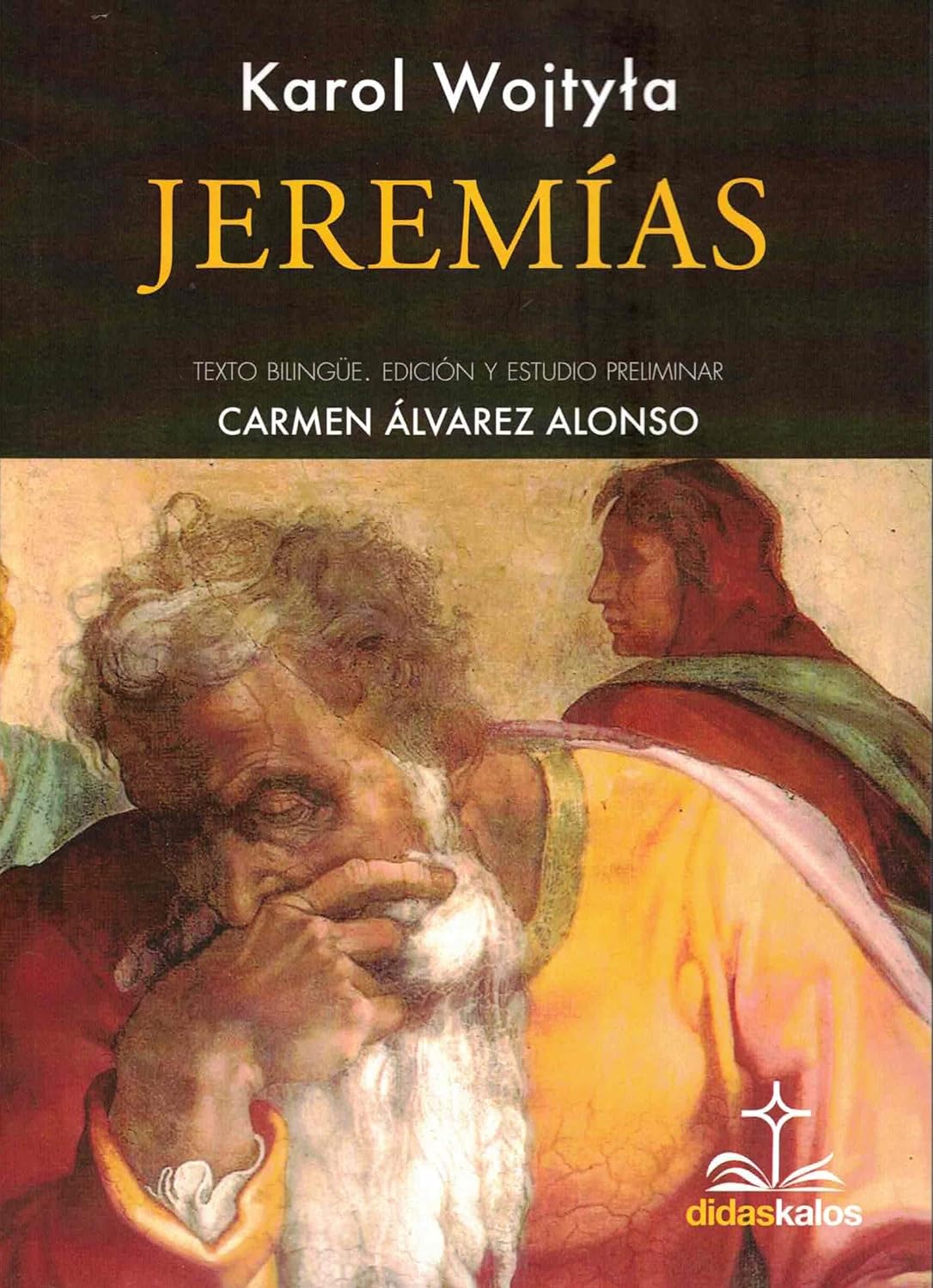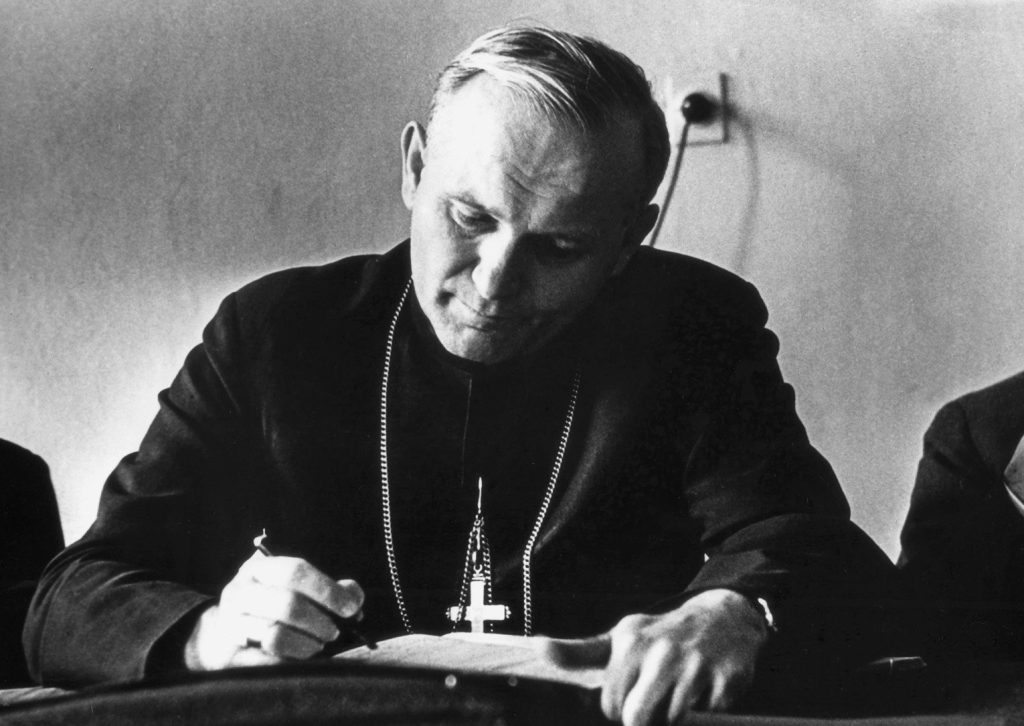Written when he was 19 years old, in the spring of 1940, "Jeremiah" is a theatrical drama by Karol Wojtyła, which had remained unknown outside the Polish sphere. Now, theologian Carmen Álvarez, professor at the San Dámaso Ecclesiastical University and expert on the figure of St. John Paul II, explains the work of the young Wojtyła to Omnes.
Shortly after the outbreak of World War II, in the midst of an extremely harsh situation of pain and suffering of the Polish people, Germany and Russia began with the occupation a tremendous campaign of "depolonization", The aim was to erase all traces of Polish culture and, especially, all traces of its Christian roots.
It was the most effective way to dissolve the national identity and the sense of homeland in the Polish people, in order to manipulate them more easily, explains to Omnes Carmen Alvarez, editor of "Jeremiah", a work that for the first time has been translated into Spanish from its Polish original. It is a bilingual edition of Didaskalospreceded by a comprehensive introductory study by the theologian from San Damaso and academic.
"Wojtyła writes "Jeremiah" to console his people, to encourage their hope and strengthen their faith in God, but also to reflect on that somber historical moment from the Christian vision of history and to ask himself about the causes of the nation's fall," adds Carmen Alvarez, who is presenting the work in various Spanish dioceses. The last one, Seville.
A similar situation was experienced by the prophet JeremiahThe book's title is the work of the prophet, who announced the destruction of Israel if the people did not return to be faithful to the covenant established with Yahweh and to their identity as God's chosen people. Hence the title of the work.

Jeremiah
Professor, how did your interest in the literary works of Karol Wojtyła, and in particular on "Jeremiah" arise?
-The rediscovery of these works came about as part of a research project. As a result of my doctoral thesis in philosophy on the literary works of Karol Wojtyła, I discovered that the documentary sources were all in Polish and that they were practically unknown outside his country. I understood, then, that they had to be translated and made known. Until now, we scholars of Karol Wojtyła had as a reference an Italian translation from more than 20 years ago; however, I believe that in this Spanish edition we have achieved notable improvements in translation and interpretation.
You have edited the play from its Polish original into Spanish directly.
- That's right, it has been a joint work with the translator. I have been in charge of all the editing, interpretation and final revision of the work. It is a bilingual edition, whose Polish text faithfully respects the original manuscript, just as Wojtyła wrote it. The work is preceded by an extensive introductory study, in which I offer some keys for reading that will help the Spanish-speaking reader to enter into the cultural and historical context of the Polish nation. It was necessary to contextualize the work, the plot and the characters in order to bring this work closer to the reader unfamiliar with Slavic culture.
Until almost the year 2020, when we celebrate the centenary of the birth of St. John Paul II, we have not been able to collect the original texts of these works of his youth. In fact, different versions of the same composition have been preserved. On the occasion of this anniversary, the Diocese of Krakow formed a team of scholars and experts who carried out an exhaustive search in libraries and archives, as well as a difficult work of textual criticism that helped to fix the original texts. The result of this arduous work was the publication of three volumes containing the whole of this juvenile literary work in its original Polish. This opened the door to the translation and dissemination of this great literary treasure left to us by the young Karol Wojtyła.
In addition, it includes an introductory study, practically another book, in which he speaks of the imprint of St. John of the Cross.
- Karol Wojtyła's theater is very philosophical and conceptual, difficult to represent because he conceives it as an "inner theater" rather than as a theater of entertainment or recreation. Hence, the critical and internal analysis of the play is very interesting, because it has brought to light the Hispanic roots of the early thought of the young Wojtyła. In his play Jeremiah, Wojtyła dialogues with the worldview proper to Romanticism, especially Polish, but in the work. the mark of Calderón de la Barca, Cervantes and his great character, Don Quixote, is also present. In addition, the legends of Gustavo Adolfo Bécquer are evoked and, above all, the imprint of St. John of the Cross is very clear.
This fact is very interesting because all biographers of John Paul II agree in affirming that Wojtyła met St. John of the Cross through the hand of the layman Jan Leopold Tyranowski, whom he met in March 1940. In the work Jeremiah San Juan's imprint is very clear and it is a work that was already written before that meeting with Tyranowski.
But, in addition, both in his work Jobwritten in the first months of that same year 1940, as in his first poems, written in the spring of 1939, we also find Sanjuanist themes and elements. Therefore, I believe that the data provided by the biographers should be reformulated. Karol Wojtyła's approach to the figure, doctrine and poetical symbolism of St. John of the Cross is much earlier and could even be situated in the years of his childhood in Wadowice, during which he frequently visited the Carmelite monastery in the city. All this Hispanic background of Wojtyła's early thought, which we were unaware of, we are now discovering, thanks to the study and translation of these literary works of his youth.
Context. Wojtyła writes Jeremiah in the first months of 1940...
- Yes, when Poland has just been invaded by Germany and Russia. It is one of the most difficult and darkest moments in Polish history. With the occupation, both Germany and Russia started a tremendous campaign of "depolonization", which aimed to erase any trace of Polish culture and especially any trace of its deep Christian roots. It was the most effective way to dissolve the national identity and the sense of homeland in the Polish people, in order to subjugate and manipulate them more easily.
Wojtyła writes Jeremiah to console his people, to encourage their hope and strengthen their faith in God, present in the darkness of the trial, but also to reflect on this dark historical moment in the light of the Christian vision of the history of nations. Why has Poland fallen, asks the author. The plot of the play and the dialogues of the characters show how the fall of a nation is related to the loss of its Christian identity and the abandonment of the moral order willed by God.
Are you targeting only the Polish people?
Karol Wojtyła writes his play "Jeremiah" in dialogue with the history of Poland, but anyone who thinks that this theatrical drama is intended only for the Polish nation would be mistaken. The play has a universal projection. Wojtyła does not seek to resolve the Polish question, but to raise, among others, the great question of national identity and, consequently, to invite every man to reflect on his personal identity in the light of his origin. In fact, when I reflect on my national identity, in the end I also ask myself who I am, who man is. Because the notion of homeland is not a political, ideological or sporting category, but one that shapes every man from his very origin. In the first roots of my personal identity there is God, family and homeland.
For Wojtyła, the destiny of every man is inseparably linked to the history and destiny of the nation. Jeremiah shows already how the question of man's identity, which will be a central axis in the magisterium of John Paul II, is already present in Karol Wojtyła's early thought.
The warning of the character Skarga, who assumes a prophetic mission, like Jeremiah, seems striking.
- The work contains a subtle but scathing critique of the national myths that spread strongly during the years of Polish Romanticism. Among them, Wojtyła dialogues especially with Sarmatism and messianism, which served to ideologically justify the exclusivist appropriation of the concept of nation by a select and elitist minority. They were the ideologies of an era which, like the ideologies of today, violently and forcibly imposed their arguments and the personal interest of a few above the truth and the common good of the nation or the individual good of the subject.
In this regard, the great speech that Wojtyła puts into the mouth of one of the protagonists of the drama, Father Peter Skarga, and which occupies the entire second act of the drama, is extremely topical. Addressing the Polish nobility, Fr. szlachta, who considered themselves as the true chosen people and the true Polish stock, Skarga harshly admonishes them against the disregard of God's Law and the economic, political, moral and cultural corruption that slowly prepared the historical downfall of Poland and its disappearance as a nation in the 18th century, during the time of the partitions.
The same thing happened at the time of the prophet Jeremiah, who announced the fall of Israel, because it was turning away from its identity as a chosen people and from the fulfillment of the covenant with Yahweh. When a nation falls into the trap of ideologies and sells its culture, its history, its religion or its morals, sooner or later it tastes its historical failure and loses the moral, historical and social strength of its specific identity.
Any additional comments?
- It seems significant to me that the work is being published in Spain, at a time when the question of national identity is being strongly raised, and also in the context of the 45th anniversary of the election of John Paul II and the beginning of his pontificate, which we celebrated on October 16, 2023.
The study of the work Jeremiah It reminded me of John Paul II's trips to Spain and, in a special way, of the event he held in Santiago de Compostela, in November 1982, and of the memorable speech that John Paul II addressed to Europe: "From Santiago, I send you, old Europe, a cry full of love: Come back to find yourself. Be yourself. Discover your origins. Revive your roots. Revive those authentic values that made your history glorious and your presence in the other continents beneficial. Rebuild your spiritual unity, in a climate of full respect for other religions and genuine freedoms... You can still be a beacon of civilization and a stimulus of progress for the world".
In light of what Karol Wojtyła discusses in his work. Jeremiah, I believe that the Pope was already announcing the fall and the moral and cultural failure of Europe, as we are seeing it today, by departing from its Christian identity and from the moral order willed by God.







